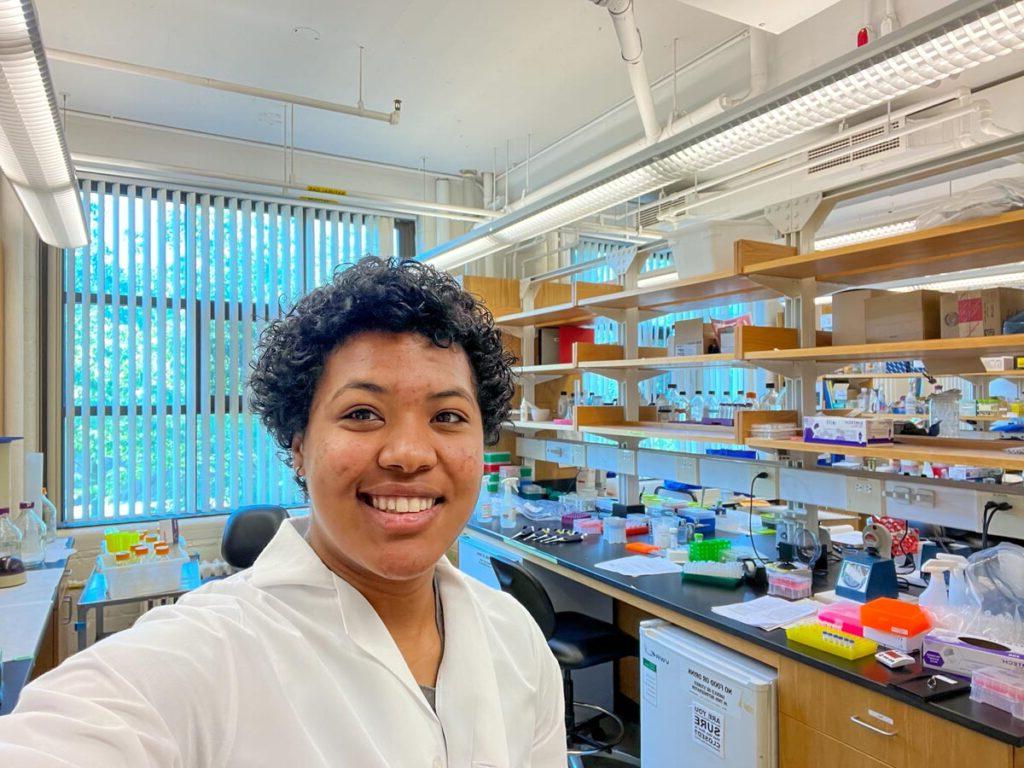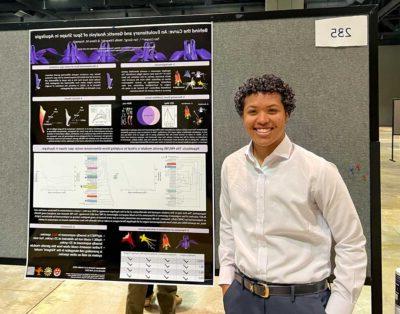After studying plants at Harvard this summer, a student recalls the racial justice series that brought them to Pitzer and looks ahead to studying abroad in Southern Africa.
 Teo Cooper ’24
Teo Cooper ’24
Pitzer senior Teo Cooper ’24 has completed not just one but two fellowships funded by the National Science Foundation (NSF). In summer 2022, they worked in a UC Berkeley biogeochemical lab and studied soil carbon sequestration. This summer, they joined The Leadership Alliance and Harvard University’s Department of Organismic and Evolutionary Biology.
NSF’s Research Experiences for Undergraduates (REU) Program funds students like Cooper for research at renowned universities. Under Harvard Professor Elena Kramer, Cooper explored plant morphology using the flower Aquilegia, known as the columbine. Cooper learned about DNA and genetics through making primers, polymerase chain reactions, virus-induced gene silencing, and in-situ hybridization. They plan to continue the research long distance.
“I wanted a lab experience this summer that would give me exposure to genetics,” said Cooper. “It’s exactly what I wanted to do: examine how and why plants adapt.”
 Cooper at Harvard University
Cooper at Harvard University
Along with other REU students, Cooper also visited the Harvard Botanical Museum’s glass flower collection, which they had learned about in a research project for a Pitzer mycology class.
Besides plants, Cooper is interested in combatting environmental racism and leveraging science to balance people and nature. Cooper was an environmental science major before transferring to Pitzer College and majoring in biology.
They were intimidated by organic chemistry and calculus before, but by their arrival at Pitzer, Cooper had enough confidence to tackle science outside their comfort zone. Cooper blossomed during the intensive science coursework—which was as thrilling as it was challenging.
Cooper was first drawn to Pitzer while watching the “True Equity” series that highlighted faculty of color and President Emeritus Melvin L. Oliver, who was the College’s first Black president.
“This was really encouraging, even though Pitzer and the 5Cs don’t have a huge Black student population,” said Cooper. “Few schools do, but I hoped that what I saw in ‘True Equity’ combined with a California location would mean a school where I could focus on learning and not be held back. I’m so glad I was able to move to Pitzer.”
Cooper had Black professors for the first time at Pitzer and found “a family and a social life” at the Black Student Union. They also discovered a bonus benefit by living in the Claremont Collegiate Apartments, which are located next to the California Botanic Garden.
 Cooper presented in a poster session at the Leadership Alliance National Conference in Hartford, CT: “Behind the Curve: An Evolutionary and Genetic Analysis of Spur Shape in Aquilegia”
Cooper presented in a poster session at the Leadership Alliance National Conference in Hartford, CT: “Behind the Curve: An Evolutionary and Genetic Analysis of Spur Shape in Aquilegia”
This semester, Cooper will live thousands of miles away from Claremont as a participant in Pitzer in Southern Africa, a multi-country comparative studies program in Botswana and South Africa. During the Pitzer-run program, students learn how to speak Setswana, stay with a host family, and engage in both countries’ histories and cultures.
When asked what excites them most about the program, Cooper said: “First is the chance to live and learn in a place where my skin color doesn’t put me on the margins. I’ve also had limited opportunities to travel for financial reasons, so just getting out and experiencing what’s beyond the USA is exciting—values, food, music, national parks.”
Cooper also looks forward to different coursework that emphasizes writing. Pitzer in Southern Africa includes an independent study project through which Cooper plans to explore more science or focus on social services. Cooper will return to campus this spring to finish senior year.